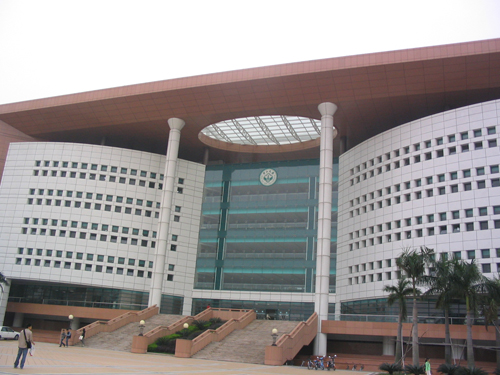
Guangzhou, China education mega center
Recession. Economic Crisis. Increasing World Competition. For Finland (The Global Search for Education: More Focus on Finland), the successful way forward in this situation was through education reform.
The impact of education on individual and national prosperity has long been debated by politicians, policy advisors, business consultants and academics. However, Professor Hugh Lauder explains, "the links between education and a modern economy are much more complex than policy makers would have us believe. Education will no longer be the route to good jobs unless we fundamentally rethink the purpose of education. Rounded students are better suited to the modern economy. If we focused on creativity versus rote learning and exam passing we just might surprise ourselves".
In an explosive new book, The Global Auction (Oxford University Press), Lauder and his co-authors, Phillip Brown and David Ashton, show how competition for good middle class jobs just got worse. Increasing worldwide competition leading to cut-priced brain power and a fundamental power shift in favor of corporate bosses and emerging economies are more than ever a threat to the prosperity of middle class Americans. To talk about this issue among other matters in our Global Search For Education series, I had the honor to chat with Hugh Lauder, Professor of Education and Political Economy, University of Bath, United Kingdom, and Head of Policy and Management Research Group.
Tell me about the background to your book, The Global Auction.
We had been working on national systems of skill formation for around 14 years. We were travelling the world interviewing policy makers in this area, and then around the turn of the century, we realized the game wasn't just about national skill systems but also about globalization and what multi-national companies were doing in relation to skills strategies . We were given a grant to interview multi-national executives about their core strategies. These companies were based in Korea, China, Singapore, Germany, India, the UK, and the United States. It very quickly became apparent that many of the assumptions we had been making were being turned over by what was going on in the global economy. We began to understand that executives in these multi-nationals (with the rise of higher education systems in China and India for example) were moving many of the high skill jobs that they had in the west to the east because they could often get the skilled graduates in those countries for a tenth of the price. Many of the assumptions that have been made in the West about globalization have been made on the belief that the 'head' work would be done in the West because of our higher education and innovation systems, and that much of the manufacturing work would be done in the East. That was true up to around 2005, but it then changed dramatically. On top of this, multi-national companies were producing what we call digital Taylorism: taking the knowledge in people's heads and codifying it into computer algorithms so that it becomes working knowledge for companies as a whole. That reduces the cost of employing high skilled workers and it very often increases the speed. For example, the NY Times reported recently that in the area of law, many of the jobs that were being done by lawyers at the bottom end of the scale, such as interns, can now be done by computer. That's an example of digital Taylorism. The political consequence of this, we think, is that there will be many graduates whose aspirations and expectations for good work will be confounded. So this raises fundamental questions about the role of education and the role of the economy in Western countries, given that China and India and other emerging economies are not only excelling in manufacturing and services, but are excelling increasingly in the areas of innovation and development.

The authors of The Global Auction at Oxford University
How does this apply to the UK educational system?
There is a tremendous amount of pressure right now for students to excel in particular tests, and what we are concerned with is the possibility that repeated testing gives them a trained incapacity to think. They don't have the creative skill required or the interpersonal skills because they are simply learning to take a test. So we have a fundamental concern with the pressure that's being applied to students through the intensification of the requirement for credentials. Testing and exams have taken too much of a high profile because that takes away from teachers and from students that essential interaction between them that can lead to firing of curiosity, to the development of intrinsic interest, and to a much more creative way of approaching the world.
How do you think we should be assessing students?
It's a difficult problem. My personal view is that exams are basically selection mechanisms, a way of sorting students, and assessment should be actually about the various ways in which students can be seen to solve problems. This can be through assignments, internships, or practical problems where you can see students working through particular issues. Indeed, many of the multi national companies said that they preferred to have students come in for internships because they could get a much better understanding of those students.
What do you think about the German educational system that directs the majority of young Germans to apprenticeships supplemented by part time schooling?
Unlike many countries in the West, only about 20% of Germans go into higher education. The remainder of the young people have the right to go into an apprenticeship, which is a dual system partly of academic education and partly of applied learning on the job. This system is efficient because it does not over produce graduates, unlike countries such as Britain and America. The system is good because the apprenticeship includes a strong element of general education to do with citizenship.
What do we do to ensure the emotional health of our students in face of increasing pressure?
There are many more students going for fewer well paid and interesting jobs. I think it is difficult to reduce the competition for those jobs. I believe we need to think about the number of tests kids are taking. Are there other ways of assessing academic work, instead of pinning everything on these tests? That's part of the answer. If you're talking about your Tiger Mums in New York, you can see why they are doing it, and asking them to slow down is going to be very difficult indeed.
How do you see the role of teachers in improving your education system?
Poor test results have been seen as an indication that we need to improve the quality of teaching in the UK. By and large, teachers understand that they have to go through the motions on these tests, but the ideology of most teachers is much more about trying to create interest and curiosity in children rather than get them through these tests. We are about to change teacher training in this country. We are moving back to an apprenticeship model which looks more like something we had in Victorian times, where instead of universities being the training places for teachers, it's actually being moved to schools themselves. I think that really good university training plus in-school training is really important to keep teachers in the game and interested. All the evidence still suggests that the key relationship is still between the teacher and the student, and the way in which a teacher can inspire students. Teachers have to be valued. They have to have a special status. I think that is really important.
Solutions from the last chapter of The Global Auction that you would like to share?
We don't see education as just being about servicing the economy. Education has to be much wider than that. It has to be about citizenship. It has to be about inspiring kids about their curiosity and their academic interest and their intrinsic motivation.

Professor Hugh Lauder and C. M. Rubin
In The Global Search for Education, join C.M. Rubin and globally renowned thought leaders including Sir Michael Barber (UK), Dr. Leon Botstein (US), Dr. Linda Darling-Hammond (US), Dr. Madhav Chavan (India), Professor Michael Fullan (Canada), Professor Howard Gardner (US), Professor Yvonne Hellman (The Netherlands), Professor Kristin Helstad (Norway), Professor Rose Hipkins (New Zealand), Professor Cornelia Hoogland (Canada), Mme. Chantal Kaufmann (Belgium), Professor Dominique Lafontaine (Belgium), Professor Hugh Lauder (UK), Professor Ben Levin (Canada), Professor Barry McGaw (Australia), Professor R. Natarajan (India), Sridhar Rajagopalan (India), Sir Ken Robinson (UK), Professor Pasi Sahlberg (Finland), Andreas Schleicher (PISA, OECD), Dr. David Shaffer (US), Chancellor Stephen Spahn (US), Yves Theze (Lycee Francais US), Professor Charles Ungerleider (Canada), Professor Tony Wagner (US), Professor Dylan Wiliam (UK), Professor Theo Wubbels (The Netherlands), Professor Michael Young (UK), and Professor Minxuan Zhang (China) as they explore the big picture education questions that all nations face today.
